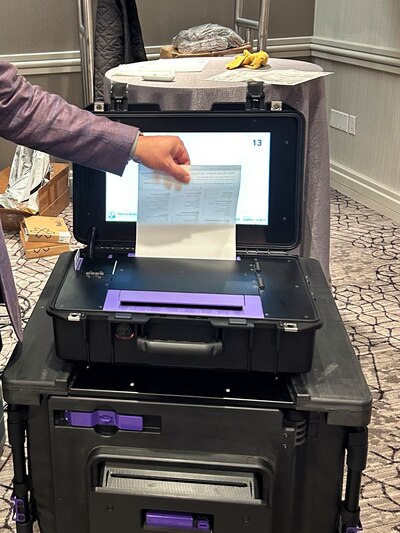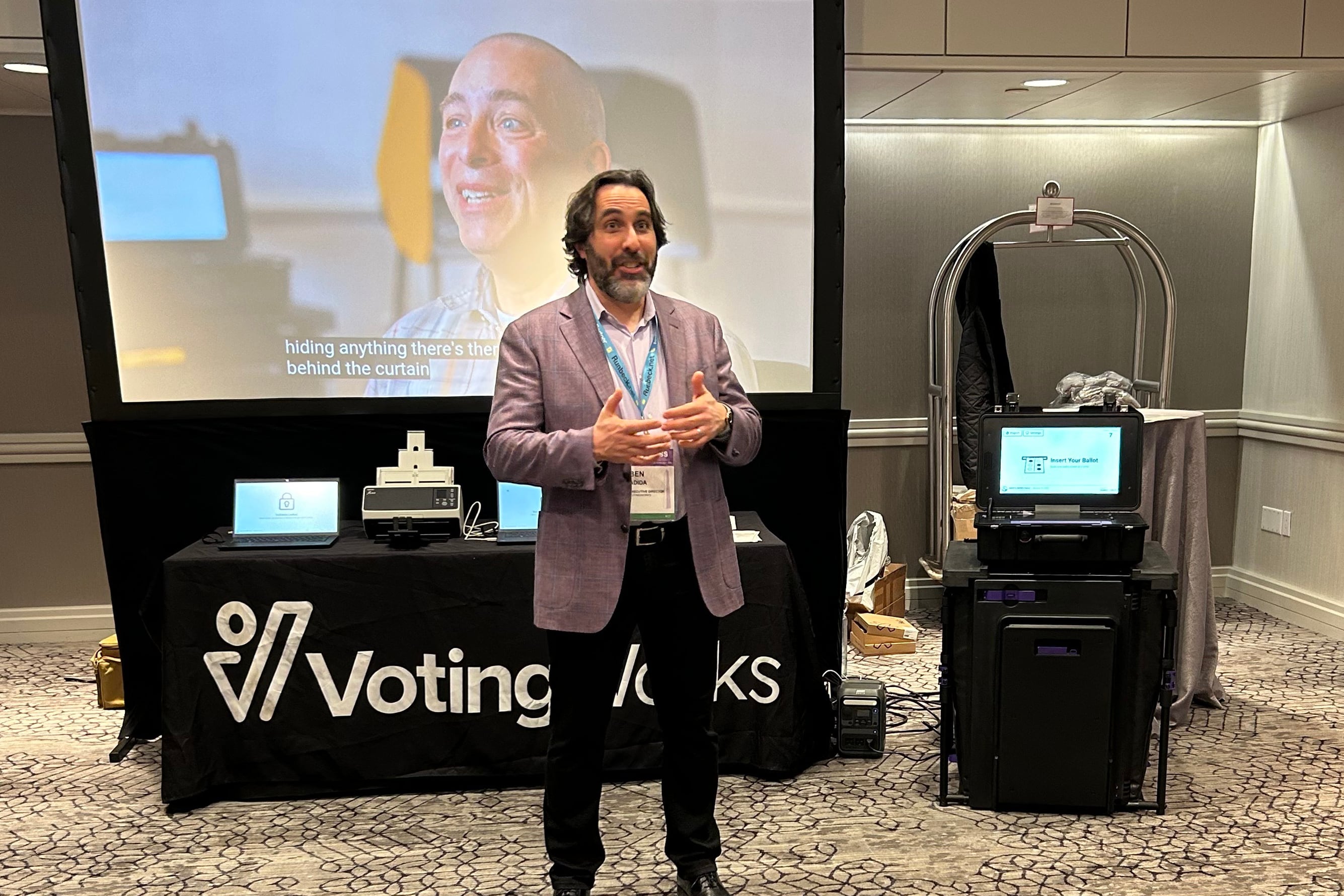Votebeat is a nonprofit news organization reporting on voting access and election administration across the U.S.
This news analysis was originally distributed in Votebeat’s free weekly newsletter. Sign up to get future editions, including the latest reporting from Votebeat bureaus and curated news from other publications, delivered to your inbox every Saturday.
At a recent gathering of election officials in Washington, D.C., a technology vendor called VotingWorks demonstrated the systems that it has submitted for federal certification this year.
VotingWorks set up test voting stations in a room, with a tabulation machine off to one side awaiting sample ballots (races on the ballot included best Election Day food). On another side, a crepe station.
It all looked like typical stuff for a vendor presentation to the National Association of Secretaries of State. But VotingWorks wasn’t a typical vendor. While the U.S. voting machine market is dominated by three for-profit companies that guard their technology closely, VotingWorks is a nonprofit and makes its code available online.
The group says its mission is to make voting equipment everyone can trust “through transparency, simplicity, and demonstrable security.” It’s the first technology company to seek federal certification for a voting system relying on publicly available code.
“I think it’s a big deal,” said Pamela Smith, CEO of Verified Voting, a nonpartisan organization that promotes the responsible use of technology in elections, who sees the election technology industry moving toward more transparency. “I think it’s a good step forward.”

Transparency could be a critical selling point following years of unfounded conspiracy theories about the accuracy and security of voting machines. The machine manufacturers, fighting off false accusations, have won settlements in the hundreds of millions of dollars in defamation cases. But they continue to face skepticism and demands from activists seeking to know more about how the systems work.
The VotingWorks setup is one of three systems that have been accepted so far to undergo testing against an updated set of voting system guidelines that the U.S. Election Assistance Commission approved in 2021. The testing takes a long time, and the first certified systems aren’t expected to hit the market until this spring.
There’s an important difference between the VotingWorks system and the others: All of its computer code is available online for public review. Other voting machine manufacturers disclose their code for testing, but don’t post it publicly, because they’re concerned about disclosing vulnerabilities.
VotingWorks’ founder and executive director, Ben Adida, says he believes disclosing the code is more secure than hiding it, because others can point out any potential security flaws, and the flaws can be fixed.
He also believes such disclosure builds voter trust in a time of increased scrutiny of how voting machines work.“ Vendors have to meet the moment of this public scrutiny,” he said.
Adida said one goal of VotingWorks’ approach is to push all election technology manufacturers to innovate in ways that shore up that public trust. He hopes VotingWorks will have an impact similar to Firefox, the open source web browser that was made by a nonprofit.
“Firefox market share has peaked and gone down over time,” Adida said. “But they changed the market, they changed how web browsers work, and the world will never go back.”
Adida said anyone can review the VotingWorks code and suggest changes or fixes, but only someone from VotingWorks could modify the code. And any changes would have to go back to the EAC for review or approval before they could be implemented by VotingWorks customers. That said, VotingWorks makes its code freely available for others to use as a basis for their own designs, too.
VotingWorks launched the first pilot of its system in Mississippi in 2019. Amy Burdine, the circuit clerk in Choctaw County, said the machines are user-friendly, and VotingWorks has made modifications based on suggestions from voters and election officials there.
The group now has contracts with five Mississippi counties and at least 40 towns and two cities in New Hampshire, where, Adida says, about a quarter of the state’s voters will cast ballots on the latest version of the system this year.
New Hampshire Secretary of State David Scanlan, a Republican, said he sees the publicly disclosed code as a good thing. “Election integrity and being transparent and having an observable process is important,” he said. What’s more, he said, election officials “just like the way the device operates.”
Election technology tends to change slowly. Since 2016, Congress has approved millions of dollars in federal grants to help jurisdictions upgrade voting machines. But a Brennan Center for Justice analysis found that tens of millions of voters live in jurisdictions using systems put in place more than a decade ago.
Many states require jurisdictions to use voting systems that have received federal certification, been tested to federal standards, or been tested in a federally accredited laboratory. When federal standards are updated, communities can typically continue to use the systems certified to meet previous versions of EAC guidelines, but local election officials interested in upgrading will soon want machines certified to the most recent standards. In New Hampshire, VotingWorks’ certification is contingent on receiving federal certification by the end of 2026.
Rodney Phillips, the town moderator in Loudon, New Hampshire, and a retired software engineer, said that when he looked at the options to replace his town’s aging AccuVote machines, he wanted something as forward-looking as possible. He liked that VotingWorks posts its code on GitHub, which he’d used in the past.
Phillips, who describes himself as a “die-hard conservative,” said it pains him to hear fellow conservatives repeat theories about the reliability of voting machines that he knows to be untrue. At one town meeting, he said, during a debate over whether to stop using tabulators in elections, he stepped down as the meeting’s moderator “so I could speak passionately.” The initiative to eliminate tabulators was voted down.
The fact that VotingWorks discloses the code publicly, he said, “won over some detractors.”
Carrie Levine is Votebeat’s interim editor-in-chief and is based in Washington, D.C. She edits and frequently writes Votebeat’s national newsletter. Contact Carrie at clevine@votebeat.org.






